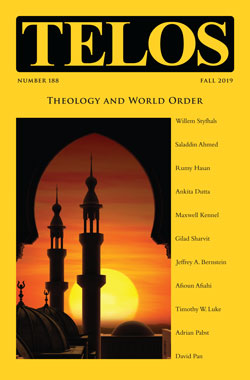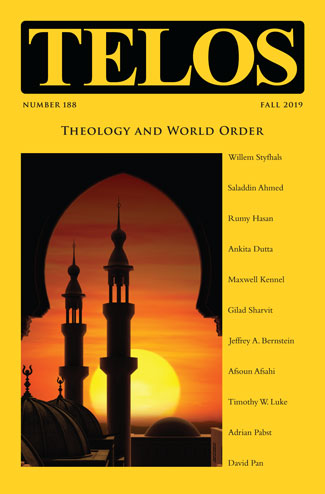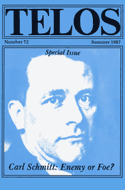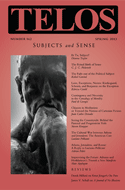By Maxwell Kennel · Friday, November 15, 2019 Maxwell Kennel’s “Periodization and Providence: Time and Eternity between Nietzsche’s Zarathustra and Augustine’s Confessions” appears in Telos 188 (Fall 2019). Read the full article at the Telos Online website, or purchase a print copy of the issue in our online store. Individual subscriptions to Telos are available in both print and online formats.
 In order to address the politics of temporal regulation and periodization, while considering ways in which competing religious and secular narratives construct contemporary subjectivity, this article compares the quasi-autobiographical narratives of Friedrich Nietzsche’s Thus Spoke Zarathustra and Saint Augustine’s Confessions. Looking beneath the surface differences between these two works, this study draws out surprising affinities and continuities between Zarathustra and the Confessions and compares each work’s vision of time and eternity. By examining Zarathustra’s parable of the gate and its punctuating moment (Augenblick) alongside Augustine’s notion of the distentio animi in book 11 of the Confessions, this article questions competing Christian and anti-Christian narratives and their use of teleology and providence in the periodization of time, and concludes by contesting these narratives from the standpoint of postsecular critique. In order to address the politics of temporal regulation and periodization, while considering ways in which competing religious and secular narratives construct contemporary subjectivity, this article compares the quasi-autobiographical narratives of Friedrich Nietzsche’s Thus Spoke Zarathustra and Saint Augustine’s Confessions. Looking beneath the surface differences between these two works, this study draws out surprising affinities and continuities between Zarathustra and the Confessions and compares each work’s vision of time and eternity. By examining Zarathustra’s parable of the gate and its punctuating moment (Augenblick) alongside Augustine’s notion of the distentio animi in book 11 of the Confessions, this article questions competing Christian and anti-Christian narratives and their use of teleology and providence in the periodization of time, and concludes by contesting these narratives from the standpoint of postsecular critique.
Continue reading →
By David Pan · Monday, September 9, 2019 Telos 188 (Fall 2019): Theology and World Order is now available for purchase in our store. Individual subscriptions to Telos are also available in both print and online formats.
 It would be naive to consider the question of global political order without engaging in debates about theology. Not only has it become clear that religious conflicts drive political ones, the very attempt to move “beyond” religion must be understood in terms of its theological meaning. The postsecular turn has not meant a return to religion so much as a realization that secularization was never a turn away from religion in the first place but rather itself a specific theological alternative among many. Accordingly, if our deepest political conflicts arise as consequences of theological disputes, we must address theology directly in order to get to the roots of major conflicts. Not only clear cases, such as conflicts between Israelis and Palestinians or between Shiite and Sunni Muslims, but also those between the United States and China revolve around theological issues that shape political and military conflict. Yet, our current approaches rely on political scientific and military calculations that have not yet been able to evaluate theology as a key and deciding factor in such conflicts. As the U.S. military and intelligence agencies debate the threat that Islamic State poses in Afghanistan, for instance, a key consideration should be the character and prospects of Islamic State’s theology, as well as the broader question of the role of theology in deciding political conflict. This issue of Telos engages in this discussion by considering how conceptions of world order arise from specific theologies. It would be naive to consider the question of global political order without engaging in debates about theology. Not only has it become clear that religious conflicts drive political ones, the very attempt to move “beyond” religion must be understood in terms of its theological meaning. The postsecular turn has not meant a return to religion so much as a realization that secularization was never a turn away from religion in the first place but rather itself a specific theological alternative among many. Accordingly, if our deepest political conflicts arise as consequences of theological disputes, we must address theology directly in order to get to the roots of major conflicts. Not only clear cases, such as conflicts between Israelis and Palestinians or between Shiite and Sunni Muslims, but also those between the United States and China revolve around theological issues that shape political and military conflict. Yet, our current approaches rely on political scientific and military calculations that have not yet been able to evaluate theology as a key and deciding factor in such conflicts. As the U.S. military and intelligence agencies debate the threat that Islamic State poses in Afghanistan, for instance, a key consideration should be the character and prospects of Islamic State’s theology, as well as the broader question of the role of theology in deciding political conflict. This issue of Telos engages in this discussion by considering how conceptions of world order arise from specific theologies.
Continue reading →
By Erik Pomrenke · Wednesday, January 3, 2018 As an occasional feature on TELOSscope, we highlight a past Telos article whose critical insights continue to illuminate our thinking and challenge our assumptions. Today, Erik Pomrenke looks at Andrew J. Mitchell’s “Entering the World of Pain: Heidegger” from Telos 150 (Spring 2010).
Heidegger’s thinking of pain allows for a positive revaluation of pain as openness, not closure, to the world. Andrew J. Mitchell contends in his “Entering the World of Pain: Heidegger,” that “pain is the surest sign that we wholly belong to this world; in fact, pain is nothing other than our contact with the world and our ‘openness’ to it.” Mitchell situates Heidegger against two popular accounts of pain: Freudian psychoanalysis and the humanist interpretation of pain as articulated by Elaine Scarry in her book The Body in Pain. Both models oppose pain and openness to the world and therefore see pain as a withdrawal from meaning. Within psychoanalysis, this takes place in the disengagement of cathexis—divestment of libido from love objects. Within the broadly humanist account, world and body are opposed. When the body demands attention, it necessitates a withdrawal from and contraction of the world. Scarry’s thought is structured by such binary oppositions as pain and meaning, interiority and exteriority, and it will be the task of Heidegger’s thinking of pain to reconfigure these oppositions by holding up pain and language as co-original phenomena—a task that Mitchell illustrates by reading Trakl.
Continue reading →
By Flaminia Incecchi · Monday, July 3, 2017 In “Values or Virtues, Nietzsche or Aristotle?” Jay Gupta outlines the way that value discourse stifles normative intention and the ethical imagination. The aim of the paper is to “suggest that the language of values disguises a deeper, normatively richer language of virtue, and . . . point[s] to the importance of recovering that language in the modern age, as well as the difficulties that must attend such a recovery.” Before exploring the merits of the article, I wish to offer a few clarificatory notes. Recently, there has been a conspicuous number of thinkers that have advocated a return to virtue ethics. Perhaps the most notable among these is Elizabeth Anscombe, who, with the paper “Modern Moral Philosophy,” uncovers the supposed banality of modern moral philosophy and points to the ways in which moral discourse has retained elements of the Christian ethical tradition.
Continue reading →
By Linas Jokubaitis · Tuesday, December 3, 2013 As an occasional feature on TELOSscope, we highlight a past Telos article whose critical insights continue to illuminate our thinking and challenge our assumptions. Today, Linas Jokubaitis looks at Joseph Bendersky’s “Carl Schmitt and the Conservative Revolution” from Telos 72 (Summer 1987).
 In his last book, Political Theology II, Carl Schmitt wrote that some books are fated to become academic legends, but contrary to the etymological meaning of the word Legende, they are not read, only cited. He knew that his persona was surrounded by many mythologies and that after his death an even greater complex of mythologies would develop around his personality and works. Today there seems to be no end to the multiplication of legends about Schmitt. Joseph Bendersky’s essay “Carl Schmitt and the Conservative Revolution” is a meticulous attempt to understand if there is any truth in the popular legend, according to which Schmitt belonged to a diverse group of intellectuals who were labeled as conservative revolutionaries. In his last book, Political Theology II, Carl Schmitt wrote that some books are fated to become academic legends, but contrary to the etymological meaning of the word Legende, they are not read, only cited. He knew that his persona was surrounded by many mythologies and that after his death an even greater complex of mythologies would develop around his personality and works. Today there seems to be no end to the multiplication of legends about Schmitt. Joseph Bendersky’s essay “Carl Schmitt and the Conservative Revolution” is a meticulous attempt to understand if there is any truth in the popular legend, according to which Schmitt belonged to a diverse group of intellectuals who were labeled as conservative revolutionaries.
Continue reading →
By Paul di Georgio · Thursday, May 2, 2013 Paul di Georgio’s “Contingency and Necessity in the Genealogy of Morality” appears in Telos 162 (Spring 2013). Read the full version online at the Telos Online website, or purchase a print copy of the issue in our store.
 This article evaluates the relationship of the concepts of contingency and necessity to the historical developments and power relations in Nietzsche’s Genealogy. Both Nietzsche and Foucault maintain that, contra Herder, their genealogies are not grounded in originary investigation. Thus for their sort of genealogy to be a philosophically useful method, the force of interpretive analysis must be located elsewhere. The analytic force, I argue, is based in the relationship of values, events, and moral beings. Specifically, I maintain that the progression of moral stages in Nietzsche’s study is ordered in such a way that the failure of each stage is logically and structurally necessary, and that each failure structures the resultant system or paradigm. However, we must also note that the historical manifestation of moral paradigms which coincide with predicted or projected theoretical structures remains contingent upon a multitude of other historical factors, most importantly, human involvement. The conclusion is that systematic internal failures of moral stages allow for but do not cause successive events, since the structural scope of possibility within which a value may be held is best explained in terms of a “middle space” characterizable in both contingent and necessary terms. This article evaluates the relationship of the concepts of contingency and necessity to the historical developments and power relations in Nietzsche’s Genealogy. Both Nietzsche and Foucault maintain that, contra Herder, their genealogies are not grounded in originary investigation. Thus for their sort of genealogy to be a philosophically useful method, the force of interpretive analysis must be located elsewhere. The analytic force, I argue, is based in the relationship of values, events, and moral beings. Specifically, I maintain that the progression of moral stages in Nietzsche’s study is ordered in such a way that the failure of each stage is logically and structurally necessary, and that each failure structures the resultant system or paradigm. However, we must also note that the historical manifestation of moral paradigms which coincide with predicted or projected theoretical structures remains contingent upon a multitude of other historical factors, most importantly, human involvement. The conclusion is that systematic internal failures of moral stages allow for but do not cause successive events, since the structural scope of possibility within which a value may be held is best explained in terms of a “middle space” characterizable in both contingent and necessary terms.
Continue reading →
|
|
 In order to address the politics of temporal regulation and periodization, while considering ways in which competing religious and secular narratives construct contemporary subjectivity, this article compares the quasi-autobiographical narratives of Friedrich Nietzsche’s Thus Spoke Zarathustra and Saint Augustine’s Confessions. Looking beneath the surface differences between these two works, this study draws out surprising affinities and continuities between Zarathustra and the Confessions and compares each work’s vision of time and eternity. By examining Zarathustra’s parable of the gate and its punctuating moment (Augenblick) alongside Augustine’s notion of the distentio animi in book 11 of the Confessions, this article questions competing Christian and anti-Christian narratives and their use of teleology and providence in the periodization of time, and concludes by contesting these narratives from the standpoint of postsecular critique.
In order to address the politics of temporal regulation and periodization, while considering ways in which competing religious and secular narratives construct contemporary subjectivity, this article compares the quasi-autobiographical narratives of Friedrich Nietzsche’s Thus Spoke Zarathustra and Saint Augustine’s Confessions. Looking beneath the surface differences between these two works, this study draws out surprising affinities and continuities between Zarathustra and the Confessions and compares each work’s vision of time and eternity. By examining Zarathustra’s parable of the gate and its punctuating moment (Augenblick) alongside Augustine’s notion of the distentio animi in book 11 of the Confessions, this article questions competing Christian and anti-Christian narratives and their use of teleology and providence in the periodization of time, and concludes by contesting these narratives from the standpoint of postsecular critique. 
 In his last book, Political Theology II, Carl Schmitt wrote that some books are fated to become academic legends, but contrary to the etymological meaning of the word Legende, they are not read, only cited. He knew that his persona was surrounded by many mythologies and that after his death an even greater complex of mythologies would develop around his personality and works. Today there seems to be no end to the multiplication of legends about Schmitt. Joseph Bendersky’s essay “Carl Schmitt and the Conservative Revolution” is a meticulous attempt to understand if there is any truth in the popular legend, according to which Schmitt belonged to a diverse group of intellectuals who were labeled as conservative revolutionaries.
In his last book, Political Theology II, Carl Schmitt wrote that some books are fated to become academic legends, but contrary to the etymological meaning of the word Legende, they are not read, only cited. He knew that his persona was surrounded by many mythologies and that after his death an even greater complex of mythologies would develop around his personality and works. Today there seems to be no end to the multiplication of legends about Schmitt. Joseph Bendersky’s essay “Carl Schmitt and the Conservative Revolution” is a meticulous attempt to understand if there is any truth in the popular legend, according to which Schmitt belonged to a diverse group of intellectuals who were labeled as conservative revolutionaries.  This article evaluates the relationship of the concepts of contingency and necessity to the historical developments and power relations in Nietzsche’s Genealogy. Both Nietzsche and Foucault maintain that, contra Herder, their genealogies are not grounded in originary investigation. Thus for their sort of genealogy to be a philosophically useful method, the force of interpretive analysis must be located elsewhere. The analytic force, I argue, is based in the relationship of values, events, and moral beings. Specifically, I maintain that the progression of moral stages in Nietzsche’s study is ordered in such a way that the failure of each stage is logically and structurally necessary, and that each failure structures the resultant system or paradigm. However, we must also note that the historical manifestation of moral paradigms which coincide with predicted or projected theoretical structures remains contingent upon a multitude of other historical factors, most importantly, human involvement. The conclusion is that systematic internal failures of moral stages allow for but do not cause successive events, since the structural scope of possibility within which a value may be held is best explained in terms of a “middle space” characterizable in both contingent and necessary terms.
This article evaluates the relationship of the concepts of contingency and necessity to the historical developments and power relations in Nietzsche’s Genealogy. Both Nietzsche and Foucault maintain that, contra Herder, their genealogies are not grounded in originary investigation. Thus for their sort of genealogy to be a philosophically useful method, the force of interpretive analysis must be located elsewhere. The analytic force, I argue, is based in the relationship of values, events, and moral beings. Specifically, I maintain that the progression of moral stages in Nietzsche’s study is ordered in such a way that the failure of each stage is logically and structurally necessary, and that each failure structures the resultant system or paradigm. However, we must also note that the historical manifestation of moral paradigms which coincide with predicted or projected theoretical structures remains contingent upon a multitude of other historical factors, most importantly, human involvement. The conclusion is that systematic internal failures of moral stages allow for but do not cause successive events, since the structural scope of possibility within which a value may be held is best explained in terms of a “middle space” characterizable in both contingent and necessary terms. 






